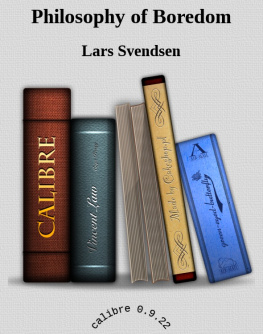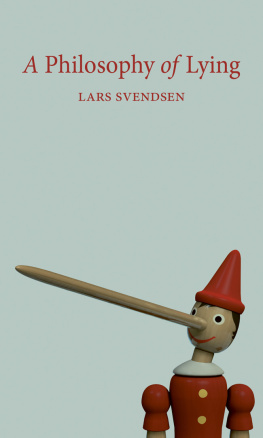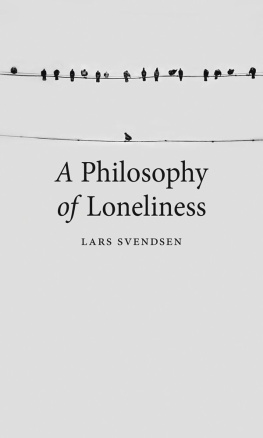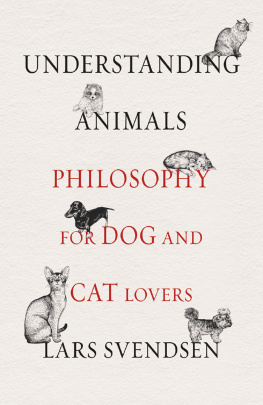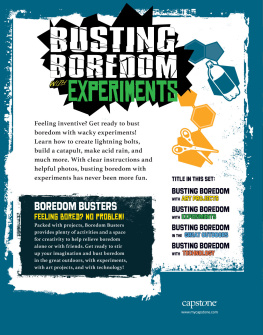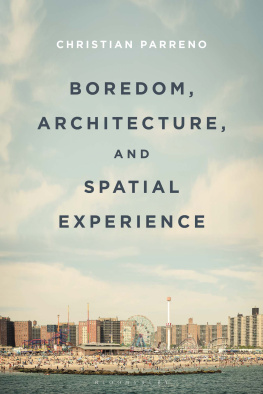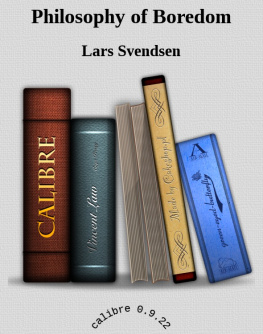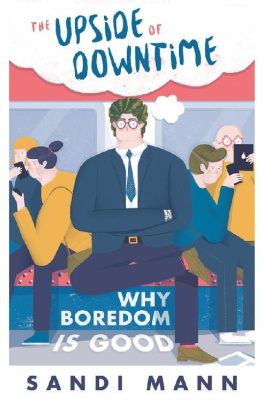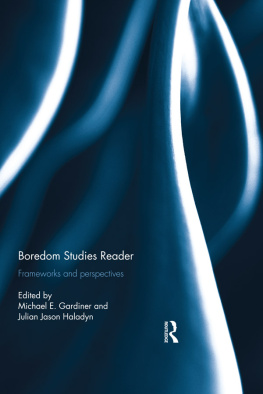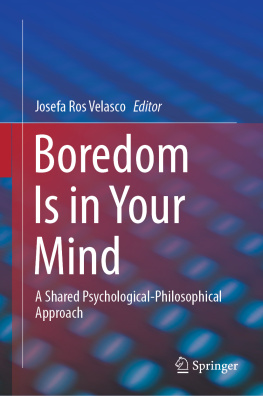
A Philosophy of Boredom
Lars Svendsen

Boredom
A Philosophy of Boredom
Lars Svendsen
Translated by John Irons
reaktion books
Published by Reaktion Books Ltd
33 Great Sutton Street
London ec1v 0dx, uk
www.reaktionbooks.co.uk
First published in English 2005, reprinted 2005, 2006, 2008
This book was first published in 1999 by Universitetsforlaget, Oslo, under the title Kjedsomhetens filosofi by Lars Fr. H. Svendsen
Universitets Forlaget
English-language translation Reaktion Books 2005
This translation has been published with the financial support of norla Non-fiction.
English translation by John Irons
All rights reserved
No part of this publication may be reproduced, stored in a retrieval system, or transmitted, in any form or by any means, electronic, mechanical, photocopying, recording or otherwise, without the prior permission of the publishers.
Printed and bound in Great Britain
by cpi Antony Rowe, Chippenham, Wiltshire
British Library Cataloguing in Publication Data
Svendsen, Lars Fr. H., 1970
A philosophy of boredom
1. Boredom 2. Boredom in literature
I.Title
152.4
isbn-13: 978 1 86189 217 1
isbn-10: 1 86189 217 9
Contents
Preface
My reason for writing this book was this: I was deeply bored for a while. What made me realise the importance of the topic, however, was the boredom-related death of a close friend. I came to the point where I had to agree with Rimbaud: boredom is no longer my love.1 Being bored was no longer merely an innocent pose or a minor infliction. Rimbauds complaint of dying of boredom2 later to be repeated in numerous pop and rock songs from G. G. Allins Bored to death to Depeche Modes Something to do suddenly became real. These songs stood out as the soundtracks of our lives. I believed that this experience was not restricted to a close circle of friends but rather indicated a serious problem regarding meaning in our contemporary culture as a whole. To investigate the problem of boredom is to attempt to understand who we are and how we fit into the world at this particular point in time. The more I thought about it, the more boredom seemed to be seminal for understanding contemporary culture. We live in a culture of boredom, and A Philosophy of Boredom is my modest attempt to come to terms with that culture.
At a more academic level, I was motivated by a certain
dissatisfaction with contemporary philosophy. Emmanuel
Levinas describes contemporary thought as one that passes through a world without human traces.3 Boredom, on the
other hand, is human all too human.
This book was originally written as an essay at a time
when I had planned to devote myself to leisure. After having completed a lengthy research project, I was going to relax and 7
do... nothing. But that turned out to be absolutely impossible to carry out. Obviously, I was unable to do nothing. So I thought I had better do something, hence this book.
Most often, we do not have any well-developed concepts
for that which torments us. Very few people indeed have any well-thought-out concept of boredom. It is usually a blank label applied to everything that fails to grasp ones interest.
Boredom is first and foremost something we live with, not so much something we think about systematically. Even so, we can attempt to develop certain concepts about boredom
so as to understand better what it is that afflicts us when it strikes. This book is an attempt to develop such thoughts about what boredom is, when it arose, why it did so, why it afflicts us, how it does so and why it cannot be overcome by any act of will.
But let me say that although everything in this book is
thematized in terms of the relation it has to boredom, it is clear that boredom is only one aspect of human existence.
My intention is in no way to reduce all of life to being an expression of boredom.
It is important to find the right form for the subject to be dealt with. I once began to read a philosophical article on love. After a few lines the following statement came up: Bob loves Kate if, and only if.... At that point, I stopped reading.
Such a formalized approach was unsuitable for treating a
subject like love, because the actual phenomenon would in all probability be lost in the process. So the reader ought not to expect such statements as: Peter is bored if, and only if
.... As Aristotle points out, we cannot seek to attain the same level of precision in all subjects; we must make do with the level that the subject-matter itself permits. Boredom is a vague, diverse phenomenon, and I believe that a long essay is the most suitable form for an investigation of it, not a strictly analytical dissertation. So I intend to present less of a cohesive argument, more a series of sketches that will hopefully 8
bring us closer to an understanding of boredom. Since the phenomenon is so diverse, it calls for an interdisciplinary approach. So I have based myself on texts from many different disciplines, such as philosophy, literature, psychology, theology and sociology.
The book consists of four main sections: Problem, Stories, Phenomenology, Ethics. In the first I give a broad account of various aspects of boredom and its relationship to modernity. The second is devoted to a presentation of certain stories concerning boredom. A central thesis here is that Romanticism constitutes the most central basis, in terms of the history of ideas, for an understanding of modern boredom. The
third focuses on Martin Heideggers phenomenological
investigations of boredom, and in the fourth I discuss what stance one can adopt to boredom as well as how one ought
not to do so. There is a loose thread that runs throughout these four sections, although each can be read independently.
I have attempted to write this book in a non-technical
style, as boredom is an experience that affects many people, plus I want this book to be accessible. Even so, certain passages are quite demanding this is simply due to the fact that the subject at times is demanding. In the course of writing, comments from friends and colleagues have been invaluable.
I thank them for their contribution, and, not least, for having put up with me at a time when I was virtually unable to talk about anything else other than the subject of this book. A special thanks must go to Stle Finke, Ellen-Marie Forsberg, Anne Granberg, Helge Jordheim, Thomas Nilsen, Hilde
Norrgrn, Erik Thorstensen and Knut Olav ms for their
detailed comments on the typescript.
one
The Problem of Boredom
boredom as a philosophical problem
As a philosopher, from time to time one must attempt to
address big questions. If one fails to do so, one loses sight of what led one to study philosophy in the first place. In my opinion, boredom is one such big question, and an analysis of boredom ought to say something important about the
conditions under which we live. We ought not and are
actually unable to avoid considering our attitude towards the question of being from time to time. There may be many initial reasons for reflecting on ones life, but the special thing about fundamental existential experiences is that they inevitably lead one to question ones own existence. Profound boredom is one fundamental existential experience. As Jon Hellesnes has asked: What can possibly be more existentially disturbing than boredom? 1
Next page
